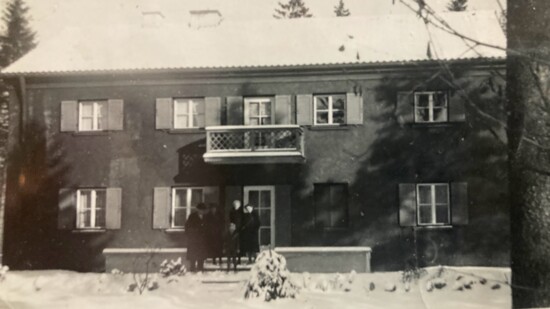Most of us can recall some vibrant childhood memories – poignant either due to their idyllic or traumatic nature. Regardless of the prevailing emotion, they seem to have a paradoxical quality. They’re both vivid, and yet, somewhat shrouded in mystery. For local veteran Norman Weber, some of his most intense childhood memories shaped his life, and yet, he wouldn’t fully understand them for many years to come.
Of course, Norman’s childhood was quite extraordinary. Born in America to two German parents, the family would return to Germany in 1939. Given the time and place, history buffs can probably predict where this is going – and what environment Norman would be subjected to. But he would have a particularly unique vantage point – and at an age that was formative.
“My family ended up living next to a forced labor camp and we lived next to a munitions factory. The largest munitions factory (DAG) the Nazi’s had. My uncle worked in that factory. He was a high official. He had a house, a beautiful house, given by the factory, and we lived there the last 9 months (of the war). And that’s where I witnessed, observed – and it’s everything in my head, what happened in the war.”
Suffice it to say, Norman saw a lot – more than any child, or adult for that matter, should have to see. He recalls, of his bird’s eye view of the Buchberg labor camp, “I saw them. And I always wondered, how did that work? How did they get there? My cousin and I shared the room upstairs on the second floor. And we would always hear – and we would see things. And we would wonder why. And my mother kept saying, keep it quiet. Keep it quiet. Even in the old house with my relatives – keep it quiet. Because I was an American citizen and that could’ve caused problems if that got out.”
It's not surprising, given what he saw at the age he saw it, that he had questions. But the adults who surrounded him were unable to contextualize it. “It bothered me that all my life long, I only knew what a child observed, but I didn’t know what the real world was. I saw human beings being mistreated and my parents would never tell me why.”
Norman observed the worst of humanity in the last 9 months of World War II, but he also witnessed heroism – in the form of the Americans coming. It’s probably one of the reasons why, when the opportunity presented itself to join the US military, Norman ended up back in the country in which he was born, to complete basic training. He would go on to spend six and a half years in the military, while getting married, adopting children, and laying down his American roots.
But what he witnessed in his childhood still confounded him. He would go down many avenues (including therapy) to cope with and attempt to understand his experiences. In 2015, he would consult the recesses of his mind (and his grandmother’s diary), to pen a book of recollections entitled, Bombs, Basements, and Bunkers: An American Boy in Germany During World War Two.
And in a serendipitous turn of events, a man in a small community in Germany would end up getting ahold of Norman’s book. That man was Friedrich Schumacher from the Geretsried Historical Working Group; Gerestried happens to be the very small Bavarian town where Norman had observed and experienced so much. The connection between Norman and Friedrich would prove to be illuminating for both of them.
“The light went on, because he could tell me what the adult world was and then I could couple that with what I knew as a child and saw,” Norman explains. In return, Norman was able to obtain documents from the American Air Force, as Friedrich wanted to know more about the bombing raid in 1945. Their relationship was symbiotic and yielded answers for both – and those answers have likely provided a sense of resolution, if not peace for Norman.
Just last year, Norman returned to Gerestried, at the behest of his friend Friedrich. After the Allies bombed the town, the empty bunkers and buildings were used to house German refugees from former ethnic German areas in Eastern Europe. In 1949, the citizens began to organize themselves and the community of Geretsried came into being in 1950.
As one might expect, it was an emotional trip, where the townspeople asked him to sign the book of remembrance of the city. Norman asked them why. “Who am I for you, because your city was founded in 1950.” They explained that he was the only person alive today who witnessed everything. “You’re the bridge for our city,” they explained. A bridge between the horrible memories of the past and the promising present day, where the town, Norman, and no doubt, the world, is still attempting to process what that young boy saw from his window. And though at times, he likely wished he didn’t, what a blessing to that town, that Norman remembers.
“It bothered me that all my life long, I only knew what a child observed, but I didn’t know what the real world was. I saw human beings being mistreated and my parents would never tell me why.”
"I observed the worst of humanity in the last 9 months of World War II, but I also witnessed heroism – in the form of the Americans coming." - Norman Weber
